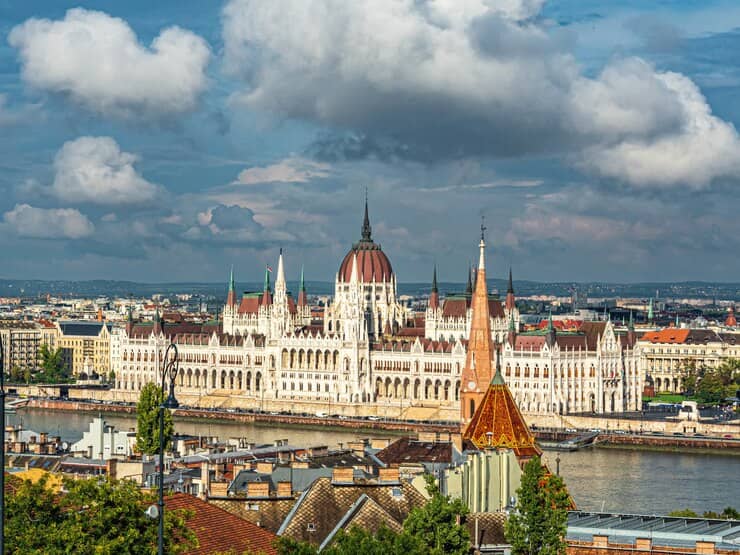Russia is considered one of the most attractive study destinations for international students from all over the world, due to its high-quality educational opportunities and reasonable tuition and living costs compared to Western countries. Obtaining a study visa in Russia is an essential step to achieving the dream of studying in this country, distinguished by its ancient culture and prestigious universities. In this article, we will discuss everything you need to know about the study visa in Russia in detail.
In a previous article, we talked about studying in Italy in a simple and comprehensive way. You can refer to the article.
Why choose to study in Russia?
Before discussing the details of obtaining a study visa, it is essential to understand why students choose Russia as an educational destination.
1. High-Quality Education
Russian universities are renowned for their academic excellence, particularly in fields such as engineering, medicine, natural sciences, and mathematics. Some Russian universities are ranked among the best in the world.
2. Affordable Living and Study Costs
Russia is an economical choice for international students compared to other European countries. Tuition fees and accommodation costs are highly reasonable, making it accessible for many.
3. Cultural and Historical Diversity
Living in Russia offers an opportunity to explore a rich culture and a history spanning centuries. Additionally, the Russian people are known for their hospitality.
4. International Recognition of Degrees
Degrees earned from Russian universities are globally recognized, enabling graduates to work or pursue further studies anywhere in the world.
Types of Study Visas in Russia
There are three main types of study visas available for students applying to study in Russia:
1. Short-Term Study Visa
Granted to students attending short courses or educational programs lasting up to 90 days.
2. Long-Term Study Visa
Issued for students enrolling in educational programs exceeding three months, such as bachelor’s, master’s, or doctoral programs.
3. Research Visa
Designed for academic researchers participating in research projects at Russian universities.
Steps to Obtain a Study Visa for Russia
- Choose a University and Program
Research Russian universities and study programs that match your academic interests. Ensure the program meets your career goals and review its admission requirements. - Obtain an Admission Letter
Apply to your chosen university via its official website or the Russian unified admission system. Once accepted, the university will issue you an official invitation letter. - Prepare the Required Documents
Essential documents for obtaining a study visa include:
- A valid passport.
- The university’s invitation letter.
- Visa application form (available from the Russian embassy).
- Two recent passport-sized photos.
- Proof of visa fee payment.
- A medical certificate proving you are free from infectious diseases, such as HIV/AIDS.
- Submit Your Application to the Russian Embassy or Consulate
- Schedule an appointment at the Russian embassy in your country.
- You may need to appear in person to submit the required documents.
- Receive Your Visa
After reviewing and approving your application, you will receive your study visa. Ensure you check its validity and duration.
Admission Requirements for Studying in Russia
To be admitted to a Russian university, students must meet the following criteria:
- Possess a high school diploma or equivalent, translated into Russian or English.
- Hold a valid passport with at least 18 months of validity from the application date.
- Provide proof of financial capability to cover tuition fees and living expenses.
- Some universities may require a minimum academic average or a financial guarantee.
- If the program is in Russian, students are required to complete a preparatory year for language learning.
Costs Associated with Study Visa for Russia
1. Visa Fees
Fees vary by country but generally range between $50 and $150.
2. Translation and Notarization Fees
Some documents may need to be translated and notarized in Russian, which adds additional costs.
3. Health Insurance
All international students must obtain health insurance covering their stay in Russia, costing approximately $100–$200 annually.
Student Life in Russia
1. Accommodation
Most Russian universities offer affordable on-campus housing for international students. Alternatively, you can rent private apartments.
2. Transportation
Russia boasts a well-developed public transportation network, making it easy to travel between cities. Students are often eligible for special discounts.
3. Language
While many programs are taught in English, learning Russian is recommended for better communication and integration.
Tips for Securing a Study Visa for Russia
- Start Early: Visa processing may take several weeks, so plan ahead.
- Be Accurate: Ensure all documents are complete and accurate.
- Seek Professional Help: If the process seems complicated, consider consulting an educational advisor.
Renewing Your Study Visa
If you need to extend your stay in Russia to complete your studies, apply for a visa renewal before its expiration. The renewal process is handled through your university in coordination with the Russian immigration office.
Working While Studying
- Russian law allows international students to work during their studies, but under certain conditions:
- A work permit is required.
- Jobs must be related to your field of study.
Student Visa Costs for Russia
Student visa fees vary depending on the type of visa and the processing time. Below are approximate costs for Egyptian citizens:
- Standard Visa (issued within 20 days): approximately EGP 4,160.
- Urgent Visa (issued within 3 days): approximately EGP 13,312.
Please note: These prices are subject to change depending on the issuing authority or intermediary agency.
Timeline for Issuing Invitation Letters
Russian universities typically start issuing invitation letters to international students from June to August each year, in preparation for the academic year beginning in September.
4. Processing Time for Invitation Letters
The issuance of an invitation letter may take 3 to 12 weeks, depending on the university and application process. Some public universities may issue the invitation within 30 days after the student is accepted.
Top Universities in Russia for International Students
If you are considering studying in Russia, selecting the right university plays a significant role in achieving your academic and professional goals. Below is a list of the most prestigious universities in Russia, welcoming thousands of international students annually:
1. Lomonosov Moscow State University (MSU)
- Location: Moscow.
- Established: 1755.
- Key Disciplines: Physics, Mathematics, Law, Medicine, and Languages.
Its advantages
- The largest and oldest university in Russia.
- Consistently ranks among the world’s top universities.
- Offers a vast library and advanced research facilities.
2. Moscow State Institute of International Relations (MGIMO)
- Location: Moscow.
- Established: 1944.
- Key Disciplines: International Relations, Political Science, Economics, and Diplomacy.
Its advantages
- A leading institution for training diplomats and policymakers.
- Offers multilingual programs.
3. Saint Petersburg State University (SPbU)
- Location: Saint Petersburg.
- Established: 1724.
- Key Disciplines: Engineering, Medicine, Arts, and Law.
Its advantages
- The second oldest university in Russia.
- Known for producing notable figures like Dmitri Mendeleev and Vladimir Putin.
4. Skolkovo Institute of Science and Technology (Skoltech)
- Location: Moscow.
- Established: 2011.
- Key Disciplines: Technology, Artificial Intelligence, Data Science, and Engineering.
Its advantages:
- A modern research-focused institution.
- Emphasis on innovation and entrepreneurship.
5. Novosibirsk State University (NSU)
- Location: Novosibirsk.
- Established: 1959.
- Key Disciplines: Nuclear Physics, Biotechnology, and Mathematics.
Its advantages
- Located in "Akademgorodok," a hub for scientific research.
- Renowned for its cutting-edge facilities.
6. Kazan Federal University (KFU)
- Location: Kazan.
- Established: 1804.
- Key Disciplines: Medicine, Engineering, Economics, and Linguistics.
Its advantages:
- Among the oldest universities in Russia.
- Known for its strong research programs.
Studying in Russia offers students access to high-quality education at an affordable cost, along with the opportunity to experience a unique culture. With careful planning and adherence to visa requirements, you can embark on a rewarding academic journey in one of the world’s most diverse countries.
7. Bauman Moscow State Technical University (BMSTU)
- Location: Moscow.
- Established: 1830.
- Key Disciplines: Engineering, Technology, and Robotics.
Its advantages:
- Recognized as one of the top technical universities in Russia.
- Strong focus on scientific research.
8. Tomsk Polytechnic University (TPU)
- Location: Tomsk.
- Established: 1896.
- Key Disciplines: Energy, Chemical Engineering, and Technology.
Its advantages:
- A leading university in Siberia.
- Known for its expertise in energy and technological fields.
9. RUDN University (Peoples’ Friendship University of Russia)
- Location: Moscow.
- Established: 1960.
- Key Disciplines: Medicine, Engineering, Law, and Languages.
Its advantages:
- Hosts students from over 150 countries.
- Focuses on promoting international relations and cultural understanding.
10. Ural Federal University (UrFU)
- Location: Yekaterinburg.
- Established: 1920.
- Key Disciplines: Engineering, Technology, and Humanities.
Its advantages:
- One of Russia’s main federal universities.
- Home to a large number of international students.
11. Moscow Institute of Physics and Technology (MIPT)
- Location: Dolgoprudny, near Moscow.
- Established: 1946.
- Key Disciplines: Physics, Mathematics, Computer Science, and Artificial Intelligence.
Its advantages:
- The leading institution for physics and mathematics in Russia.
- Offers advanced programs focusing on research and innovation.
12. Belgorod State University (BelSU)
- Location: Belgorod.
- Established: 1876.
- Key Disciplines: Medicine, Engineering, and Humanities.
Its advantages:
- Known for its strong medical programs.
- Affordable tuition and living costs for international students.
13. Perm State University (PSU)
- Location: Perm.
- Established: 1916.
- Key Disciplines: Economics, Law, and Languages.
Its advantages:
- Offers high-quality education across diverse fields.
- Known for its rich academic history.
Studying in Russia provides an unparalleled opportunity to access top-tier education at an affordable cost while immersing yourself in a culturally rich environment. The diverse range of universities and programs ensures that students from all backgrounds can find an institution that aligns with their academic and professional aspirations.
By choosing a suitable university, preparing your application thoroughly, and following the necessary steps to secure a study visa, you can set the foundation for a bright academic and professional future. Start planning today to embark on a transformative educational journey in Russia!
Tips for Choosing the Right University
1. Determine Your Major: Choose a university based on the field of study you are passionate about, especially if the university excels in your academic domain.
2. Budget: Compare tuition fees and living costs among different universities.
3. University Location: Pick a city that aligns with your lifestyle preferences, whether it’s a bustling metropolis like Moscow or a quieter area like Novosibirsk.
4. International Ranking: Check the university's global ranking to understand the recognition of its degrees.
Russian universities offer diverse programs and unique specializations, making them an ideal destination for ambitious students from around the world. Select the university that fits your needs and embark on an exceptional academic journey in Russia!
Importance and Benefits of Studying in Russia
Studying in Russia is a unique experience that combines high-quality education, rich culture, and affordable costs compared to Western countries. As one of the top educational destinations for international students, Russia provides an exceptional learning environment with diverse academic and professional opportunities. Here are the key benefits and significance of studying in Russia:
1. Exceptional Quality of Education
- World-Class Universities: Russia is home to many globally ranked universities, such as Moscow State University and Saint Petersburg State University.
- Diverse Programs: Russian universities offer a wide range of academic programs, from medicine and engineering to arts and humanities.
- Focus on Research: The universities emphasize scientific research and innovation, equipping students with advanced practical skills.
2. Affordable Tuition and Living Costs
- Low Tuition Fees: Education costs in Russia are significantly lower than in European or American institutions, with scholarships available to cover expenses.
- Reasonable Living Costs: Accommodation, food, and transportation in Russia are relatively inexpensive, making it an economical choice for international students.
3. Cultural and Historical Diversity
- Rich Culture: Russia blends European and Asian cultures, offering students the chance to explore its rich history and diverse arts.
- Russian Language: Learning Russian during your studies adds a valuable skill to your resume and expands career prospects.
4. Internationally Recognized Degrees
Degrees from Russian universities are globally recognized, enabling graduates to work or continue their studies anywhere in the world.
5. Multicultural Environment
Russian universities host students from over 160 countries, creating a multicultural learning atmosphere that fosters understanding and communication among diverse nationalities.
6. Post-Graduation Work Opportunities
- International students can stay in Russia after graduation to work with Russian or multinational companies.
- Universities support students through career offices and professional networking opportunities.
7. Attractive Scholarships
The Russian government and university programs offer scholarships for international students, covering tuition, accommodation, and even living expenses.
8. Advanced Technology and Modern Facilities
Many Russian universities are equipped with state-of-the-art laboratories and modern facilities, enabling students to gain practical and scientific expertise.
9. English-Taught Programs
Numerous Russian universities provide programs in English in fields like medicine, engineering, and business, eliminating language barriers for non-Russian speakers.
10. Discovering Life in Russia
Living in Russia allows students to experience a different lifestyle and explore famous cities like Moscow and Saint Petersburg, along with breathtaking natural landscapes such as Siberia and Lake Baikal.
11. Simple Visa Process
Obtaining a student visa for Russia is relatively straightforward compared to other countries, making it a preferred destination for international students.
12. World-Class Specializations
- Medicine: Russia is among the best countries to study medicine, offering excellent education at affordable costs with globally recognized medical universities.
- Engineering: Russian universities are leaders in engineering and technology, particularly in nuclear and energy engineering.
- Mathematics and Sciences: Russia has a long-standing reputation for excellence in mathematics and physics education.
13. Balance Between Study and Leisure
Russia provides an environment that encourages students to balance academic pursuits with cultural and social activities, including visits to historical landmarks.
14. Personal and Professional Skill Development
- Independence: Living in a new country helps you build self-reliance skills.
- Adaptability: Interacting with different cultures enhances your communication and adaptability.
Studying in Russia offers not just high-quality education but a comprehensive life experience, helping students broaden their horizons and acquire invaluable cultural and professional knowledge. With affordable costs and prestigious universities, Russia is an excellent choice for students aspiring to achieve their academic and career goals.
Pros and Cons of Studying in Russia
If you're considering studying in Russia, it’s essential to weigh the benefits and challenges to determine if this choice suits your needs. While Russia offers exceptional educational opportunities, it also presents some challenges. Below is a balanced overview of the pros and cons:
Pros of Studying in Russia
- High-Quality Education
Renowned universities like Moscow State University provide advanced programs in various fields, including medicine, engineering, and technology. - Affordable Costs
Tuition fees and living expenses in Russia are significantly lower than in Western countries. - International Recognition of Degrees
Most Russian universities are internationally accredited, providing opportunities for global employment and further studies. - Diverse Specializations
Russia excels in fields such as medicine, engineering, mathematics, and physics. - Scholarship Opportunities
Generous scholarships help cover tuition and living expenses for international students. - Cultural and Historical Richness
The multicultural environment and rich heritage provide students with a unique experience. - English Programs
English-taught programs make education accessible for students who don’t speak Russian.
Cons of Studying in Russia
- Harsh Weather
The cold climate, especially in winter, can be challenging for students from warmer regions. - Language Barrier
Daily life often requires proficiency in Russian, which can be difficult to learn. - Bureaucratic Processes
Lengthy administrative procedures for visa renewals or residence registrations can be frustrating. - Cultural Adjustment
Adapting to Russian culture and social norms might take time.
Is Studying in Russia Right for You?
Studying in Russia is an excellent option for students seeking affordable, high-quality education while experiencing a rich cultural environment. With preparation and adaptability, you can make the most of this transformative academic journey.
Does Studying in Russia Require a Dummy Ticket?
When applying for a student visa to study in Russia, you may be required to provide certain travel-related documents. Below is an explanation of these requirements and whether a Dummy Ticket is necessary:
1. Student Visa Requirements for Russia
When applying for a student Russia visa, you’ll need to submit various documents, such as:
- Admission letter from the Russian university.
- A valid passport.
- Passport-sized photo.
- Visa application form.
- Proof of tuition payment (in some cases).
- Travel confirmation (a flight reservation may be required).
2. Is a Dummy Ticket Required?
- Generally: A Dummy Ticket is often needed as proof of your intent to travel, rather than a fully purchased ticket.
- Dummy Ticket: You can obtain a Dummy Ticket from travel agencies or airlines without paying the full ticket price. This is usually sufficient for consular requirements.
- Exceptions: Some Russian consulates may not require a flight reservation if you provide other documents, such as your university admission letter.
3. How to Obtain a Dummy flight Ticket
- Through travel agencies: Many travel agencies offer the service of issuing a Dummy flight Ticket Dummy-ticket for a small fee, and on our website we provide you with the best services and provide you with a temporary flight reservation easily and quickly.
- From Airlines: Some airlines allow you to reserve a ticket for 24–72 hours without full payment.
- Online Platforms: Various online platforms offer temporary flight reservations tailored to meet embassy requirements.
4. After Visa Approval
Once your student visa is approved, you’ll need to purchase your final flight ticket to travel to Russia. Choose a flight that aligns with your university's schedule.
Studying in Russia for Syrian Students
- Tuition fees at Russian universities range from USD 1,880 to 13,500 per year, depending on the field of study and institution.
- The Russian government sometimes offers partial or full scholarships to Syrian students.
- Syrian applicants are advised to check for current policies, as some universities have temporarily suspended new admissions due to administrative regulations.
Studying in Russia for Egyptian Students
- Tuition fees typically range between USD 2,000 and 8,000 per year, varying by university and specialization.
- Russian universities offer programs in both Russian and English.
- The cost of the preparatory year for learning Russian ranges from USD 1,200 to 3,000.
Important Tips
Always check the specific requirements of the Russian embassy in your country, as they may vary slightly.If unsure, consult with the university you’ll be attending for guidance on visa and travel requirements.
Dummy flight Ticket are typically required for student visa applications but are not mandatory in every case. Ensure you verify the requirements with your local embassy and consider using trusted services for Dummy Tickets to simplify the process.
Russia offers high-quality education and diverse academic options for Arab students, within a multicultural environment. It is highly recommended to contact universities directly or work with accredited agencies to obtain the most accurate and up-to-date information before applying.



